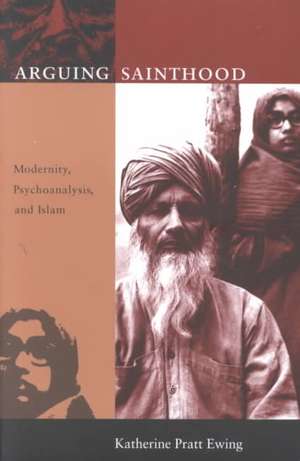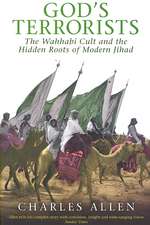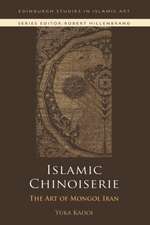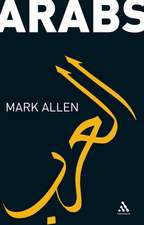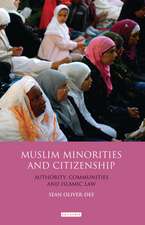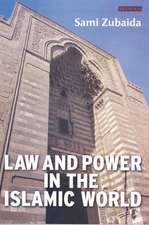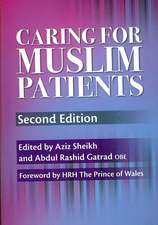Arguing Sainthood – Modernity, Psychoanalysis, and Islam
Autor Katherine Pratt Ewingen Limba Engleză Paperback – 16 oct 1997
Ewing critiques Eurocentric cultural theorists and Orientalist discourse while also taking issue with expatriate postcolonial thinkers Homi Bhabha and Gayatri Spivak. She challenges the notion of a monolithic Islamic modernity in order to explore the lived realities of individuals, particularly those of Pakistani saints and their followers. By examining the continuities between current sufi practices and earlier popular practices in the Muslim world, Ewing identifies in the Sufi tradition a reflexive, critical consciousness that has usually been associated with the modern subject. Drawing on her training in clinical and theoretical psychoanalysis as well as her anthropological fieldwork in Lahore, Pakistan, Ewing argues for the value of Lacan in anthropology as she provides the basis for retheorising postcolonial studies.
Arguing Sainthood offers a complex understanding of Islamic influence and practice in relation to Pakistans position as an autonomous nation. It will interest scholars of Islamic studies, postcolonial studies, and anthropology.
Preț: 267.32 lei
Nou
Puncte Express: 401
Preț estimativ în valută:
51.15€ • 54.70$ • 42.65£
51.15€ • 54.70$ • 42.65£
Carte tipărită la comandă
Livrare economică 18 aprilie-02 mai
Preluare comenzi: 021 569.72.76
Specificații
ISBN-13: 9780822320241
ISBN-10: 082232024X
Pagini: 328
Ilustrații: 13 black and white photographs
Dimensiuni: 150 x 250 x 15 mm
Greutate: 0.53 kg
Ediția:New.
Editura: MD – Duke University Press
ISBN-10: 082232024X
Pagini: 328
Ilustrații: 13 black and white photographs
Dimensiuni: 150 x 250 x 15 mm
Greutate: 0.53 kg
Ediția:New.
Editura: MD – Duke University Press
Recenzii
"This is an important book, one that is significant for the discourses of Pakistani modernity and the dilemmas it creates, the internal differentiations in Pakistani society, and the historical forces that brought them about." - Gananath Obeyesekere, Princeton University
"Arguing Sainthood can and should be used in courses on modernity, postcolonialism, the Middle East, South Asia, and in other coursesÑcultural studies, religion - where Lacanian ideas are not unfamiliar." - Michael M. J. Fischer, Massachusetts Institute of Technology
"This is an important book, one that is significant for the discourses of Pakistani modernity and the dilemmas it creates, the internal differentiations in Pakistani society, and the historical forces that brought them about." - Gananath Obeyesekere, Princeton University "Arguing Sainthood can and should be used in courses on modernity, postcolonialism, the Middle East, South Asia, and in other coursesNcultural studies, religion - where Lacanian ideas are not unfamiliar." - Michael M. J. Fischer, Massachusetts Institute of Technology
"Arguing Sainthood can and should be used in courses on modernity, postcolonialism, the Middle East, South Asia, and in other coursesÑcultural studies, religion - where Lacanian ideas are not unfamiliar." - Michael M. J. Fischer, Massachusetts Institute of Technology
"This is an important book, one that is significant for the discourses of Pakistani modernity and the dilemmas it creates, the internal differentiations in Pakistani society, and the historical forces that brought them about." - Gananath Obeyesekere, Princeton University "Arguing Sainthood can and should be used in courses on modernity, postcolonialism, the Middle East, South Asia, and in other coursesNcultural studies, religion - where Lacanian ideas are not unfamiliar." - Michael M. J. Fischer, Massachusetts Institute of Technology
Notă biografică
Textul de pe ultima copertă
""Arguing Sainthood" can and should be used in courses on modernity, postcolonialism, the Middle East, South Asia, and in other courses--cultural studies, religion--where Lacanian ideas are not unfamiliar."--Michael M. J. Fischer, Massachusetts Institute of Technology
Descriere
Examines the competing forces behind the formation of a modern western subjectivity in the context of Sufi religious meanings and practices in Pakistan
